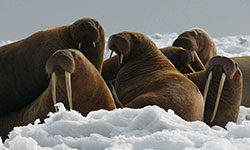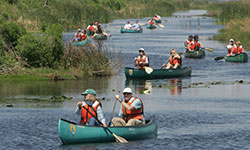FEDERAL AGENCY RECIPIENT
Northern Institute of Applied Climate Science, U.S. Forest Service - Houghton, Michigan
The Northern Institute of Applied Climate Science (NIACS) exemplifies the value of bringing partners together to achieve results and foster climate change adaptation. As a highly collaborative institute chartered by public and private organizations and led by the U.S. Forest Service, NIACS includes federal and state agencies, tribes, non-governmental groups, universities, forest industry groups, and researchers in all aspects of its work. Some of its most notable achievements have been in developing vulnerability assessments and integrating the science from these assessments into forest planning processes and management activities in support of climate change adaptation. This work has taken place across large landscapes, such as the northern Great Lakes, the Central Appalachians, and New England, and been implemented in on-the-ground activities in diverse ownerships. NIACS has applied research related to climate change science, forest response, and management strategies for adaptation and transformed discussions within the forest management community about the impacts of climate change across the Midwest and Northeastern U.S. An adaptation workbook and associated website, workshops, and trainings have given managers sound science and the tools to better and more proactively manage forests while taking climate vulnerability into consideration. Most importantly, the collaborative approach NIACS uses to bring scientists, resource managers, and decision makers together has supported climate-informed decision making that is grounded in the needs and perspectives of people who work and live with the land.
FEDERAL INDIVIDUAL RECIPIENT
Dan Isaak, U.S. Forest Service - Boise, Idaho
Dan Isaak has integrated and leveraged data from multiple existing observational and monitoring networks across large geographic domains and developed state-of-the-art decision support tools to facilitate climate change vulnerability assessments and more efficient monitoring in forest streams. Mr. Isaak was extremely effective in ensuring that this new science was understood and used by numerous partners across hundreds of millions of acres of land in the western U.S. that encompass more than 1 million kilometers of streams. His thoughtful and practical insights have been critical to identifying priority actions and locations for increasing the conservation of aquatic species and habitats by implementing adaptation actions to reduce non-climatic stressors, such as migration barriers and land use impacts to streams.
STATE/LOCAL AGENCY RECIPIENT
Environmental Affairs Division, Seattle City Light - City of Seattle, Washington
Seattle City Light is committed to adapting the management of hydropower resources and regional fish and wildlife habitats to a changing climate. A new initiative supports collaborative research to increase the collective knowledge of impacts to water, fish, and wildlife resources. The initiative resulted in the creation of an adaptation plan that brought climate change information into long-term plans for hydropower resources and recovery of Endangered Species Act (ESA) listed species. Seattle City Light purchases, protects, and restores fish and wildlife habitat and is adapting this work to help ensure that the recovery and protection of ESA listed species can be achieved even with the stresses posed by climate change. Seattle City Light leads on climate adaptation in the hydropower industry, and wider energy sector, by initiating information exchange and collaboration with universities, other utilities, tribal governments, and resource management agencies.
STATE/LOCAL INDIVIDUAL RECIPIENT
John R. "Jack" Sullivan, Wisconsin Department of Natural Resources - Madison, Wisconsin
Jack Sullivan was instrumental in establishing Wisconsin's leading climate adaptation group, the Wisconsin Initiative on Climate Change Impacts (WICCI), a statewide network of individuals and more than 70 organizations from the Wisconsin Department of Natural Resources, University of Wisconsin, and various partner agencies and organizations around the state. As the director of the science program at the Wisconsin Department of Natural Resources, his leadership brought many different areas of natural resource research into focus and helped integrate this work into WICCI's first report that outlines specific climate change impacts and adaptation strategies for Wisconsin. Mr. Sullivan continuously led the charge to ensure the state's natural resource research program was an active partner both at the state level and the federal level to effect positive change.
TRIBAL RECIPIENT
Swinomish Indian Tribal Community - La Conner, Washington
The Swinomish Indian Tribal Community Climate Change Initiative is a leader in climate adaptation. The Swinomish conducted assessments; developed plans; implemented on-the-ground adaptation; fostered partnerships; incorporated community members into planning; and developed tools for other tribal communities to use to conserve their own unique natural and cultural resources. This initiative and development of Indigenous Health Indicators has led climate actions along the Swinomish Reservation and neighboring areas. The beginning phases of the project developed a comprehensive Impact Assessment Technical Report and Climate Adaptation Plan, which enhanced knowledge and capacity of local land managers to understand and adapt to climate threats for the betterment of species, habitats and ecosystems. Additionally, the community education and outreach aspects of the project fostered knowledge and engagement from local community members.
NON-GOVERNMENTAL ORGANIZATION RECIPIENT
National Wildlife Federation - Washington, DC
The National Wildlife Federation (NWF) has played a major role in advancing and promoting climate adaptation across the conservation community through: 1) raising awareness about the urgent need for climate adaptation by highlighting the impacts and consequences of climate change for fish and wildlife; 2) advancing the science and practice of adaptation by leading the development of widely-used adaptation guidance for conservation practitioners; and 3) promoting broad adoption of sound adaptation principles and practices through webinars, training courses, outreach to state wildlife agencies, advisory services, and on-the-ground adaptation projects. Collaboration has been a hallmark of NWF’s approach to advancing the science and practice of climate adaptation, and this work was carried out with a wide array of partners, including federal, state, and local agencies, non-governmental organizations, professional societies, and academic institutions.
BROAD PARTNERSHIP RECIPIENT
Roundtable on the Crown of the Continent
The State of Montana; British Columbia and Alberta, Canada
The Roundtable's Adaptive Management Initiative (AMI) is significant as an example of both accomplishing climate adaptation projects and demonstrating how an organization is able to catalyze and implement a landscape scale, collaborative approach. The goal of the AMI is to promote a culture of stewardship by finding common values, supporting community leadership, promoting shared learning, and seeking place based solutions. The Roundtable is building a connected ecosystem-wide program that connects land managers from federal, state, nonprofit, and private entities; supporting on-the-ground projects that identify threats to the landscape and build resilience into natural and social processes; and respecting and building culture, community, and conservation.
2016 HONORABLE MENTIONS
Federal Agency Honorable Mention:
U.S. Geological Survey National Climate Change and Wildlife Science Center & U.S. Department of the Interior Climate Science Centers - Reston, VA
The U.S. Geological Survey (USGS) National Climate Change and Wildlife Science Center (NCCWSC) and the eight regional U.S. Department of the Interior (DOI) Climate Science Centers (CSCs) collaborate with universities, resource management organizations, Tribes, and other partners to provide unbiased scientific data and tools that contribute to an understanding of the widespread impacts of climate change on fish, wildlife, ecosystems, and people.
Federal Individual Honorable Mentio:
David L. Peterson, U.S. Forest Service - Seattle, WA
Dr. David Peterson is an irreplaceable source of knowledge about forest ecosystems and how they are affected by wildfire and climate change. His climate change adaptation guidebook and vulnerability assessments have provided a foundation for developing adaptation options that are mitigating the negative effects of climate change across millions of acres of forest in the western U.S.
State/Local Agency Honorable Mention::
Colorado Parks and Wildlife, Colorado Natural Heritage Program in collaboration with the Department of the Interior’s North Central Climate Science Center - Fort Collins, CO
Colorado Parks and Wildlife (CPW) worked with the Colorado Natural Heritage Program (CHNP) and the North Central Climate Science Center to ensure climate change was considered in the revision of Colorado’s State Wildlife Action Plan. The collaboration used the best climate and habitat modeling knowledge and resources available and a high level of subject-expert involvement in the process.
State/Local Individual Honorable Mention:
Robert Glazer, Florida Fish and Wildlife Conservation Commission’s Fish and Wildlife Research Institute - Marathon, Florida
Robert Glazer’s work with the State of Florida and as Executive Director of the non-profit Gulf and Caribbean Fisheries Institute has been instrumental in reducing non-climate stressors on marine and coastal systems and developing capacity to address climate change within the management community of marine protected areas. His activities as Chair of the Monroe County Climate Change Advisory Committee have provided adaptation options for the Florida Keys including the adoption of a Climate Action Plan.
Tribal Honorable Mention:
Bad River Band of Lake Superior Tribe of Chippewa Indians - Odanah, Wisconsin
The Bad River Band of the Lake Superior Tribe of Chippewa Indians is working to understand how climate change is and will be affecting a manoomin (wild rice), a cold weather species of profound cultural significance to the Tribe. Knowledge gained will help the Tribe make management decisions that will most effectively protect and sustain manoomin and its aquatic habitat for the next seven generations.
NGO Honorable Mention:
NatureServe - Arlington, Virginia
NatureServe is playing a significant role in transforming the NFWPCAS into a successful model for collaborative, multi-institutional national conservation efforts by supporting climate-smart conservation training; integrating climate change assessment and adaptation into its decision support system; updating climate change vulnerability indices; and catalyzing action through the Ecosystem-based Management Tools Network.
Broad Partnership Honorable Mention:
Planning team for the project "Climate-Smart Adaptation for the North-central California Coast and Ocean" - San Francisco, California
Coordinated by NOAA’s Greater Farallones National Marine Sanctuary, the planning team for the project “Climate-Smart Adaptation for the North-central California Coast and Ocean” has demonstrated exceptional collaboration and ingenuity in advancing the region's understanding of climate impacts and vulnerabilities to coastal and marine ecosystems by developing a Vulnerability Assessment Report and advancing an adaptation planning process to address those vulnerabilities.
View the list of 2016 Award Nominees




